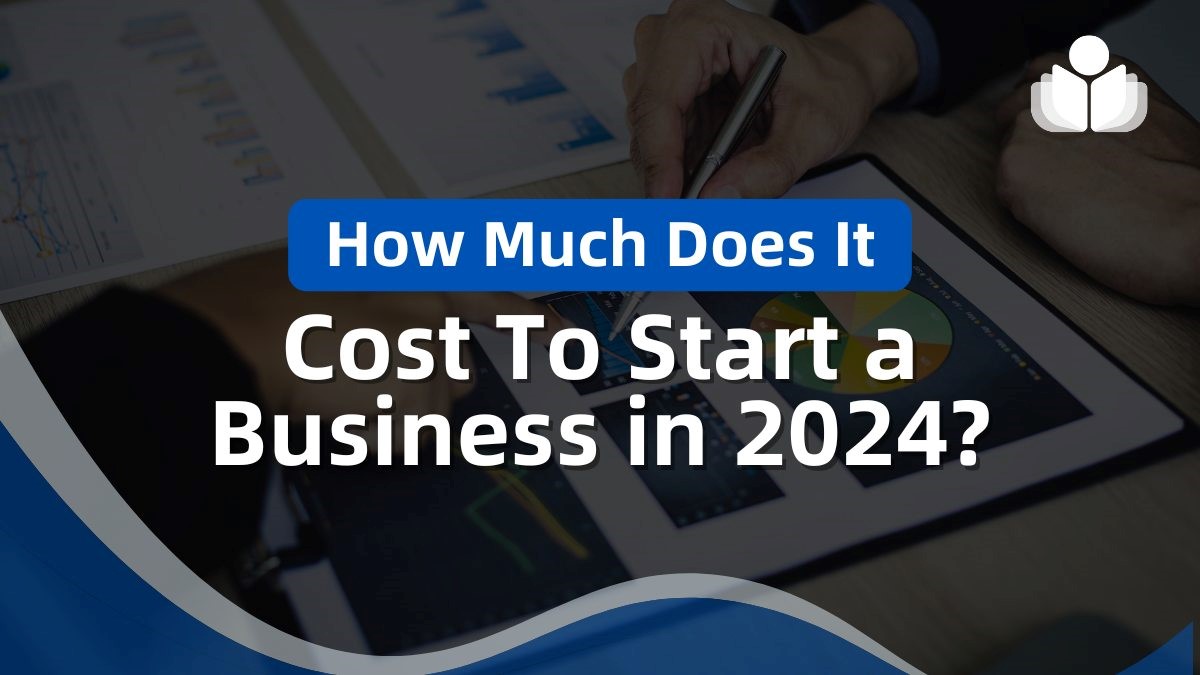How much will it cost to start your business? Anyone thinking about becoming an entrepreneur needs to ask this key question. You must take time to figure out your startup costs. This helps you know how much money you need to raise and if starting your business makes sense.
It’s great to determine how much it costs to keep your business going as you try to increase sales in the early stages.
Startup costs can vary depending on whether you’re opening a physical store, an online business, or a service. However, one thing remains the same: successful businesses need careful planning.
Even if you don’t know how much everything will cost, it’s crucial to begin estimating the expenses you’ll have to start your business.
Determining Your Initial Business Costs
Identifying Initial Expenses
When planning your business, the first step is identifying your startup expenses. You’ll incur these costs before you even open your doors, such as licensing fees, legal costs, marketing, and initial inventory purchases. Carefully estimating these expenses will help you understand how much capital you need to get started.
Recognizing Initial Assets
Startup assets are the tangible and intangible items your business needs to operate from day one. This could include equipment, vehicles, real estate, or even software licenses. Unlike expenses, assets have lasting value and contribute to the ongoing operation of your business.
The Importance of Distinguishing Between Assets and Expenses
Separating your startup assets from your expenses is crucial for precise financial planning. Assets represent long-term investments that will benefit your business over time, whereas expenses are immediate costs that may not offer long-term value. Correctly categorizing these can affect your tax filings and give you a better picture of your financial health.
Understanding Ongoing Operating Costs
Operating expenses are the recurring costs your business will face after the startup phase. These include rent, utilities, salaries, and inventory replenishment. Accurately forecasting these expenses is essential for managing cash flow and ensuring the sustainability of your business.
Estimating the Necessary Initial Capital
To determine how much startup cash you’ll need, combine your initial expenses, assets, and projected operating costs for the first few months. This estimate will help you understand the financial runway required to keep your business afloat until it becomes self-sustaining. Proper planning ensures you’re not caught off guard by unexpected costs.
Recurring Costs
Rent and Utilities
One of the most significant recurring expenses for any business is rent for office, retail, or industrial space. The cost varies depending on location, size, and type of property, but it typically represents a substantial portion of the business’s fixed costs. Alongside rent, utilities such as electricity, water, and internet service are essential operational expenses.
These costs can fluctuate based on usage and the time of year but are necessary for maintaining a functional and comfortable work environment. Businesses must budget for these recurring costs to ensure they can continue operating smoothly.
Employee Salaries and Benefits
Employee salaries and benefits are among the most substantial ongoing costs for businesses. Payroll includes wages and additional expenses like health insurance, retirement plans, paid time off, and other benefits. These costs are vital for attracting and retaining talent, ensuring employee satisfaction, and maintaining productivity.
As businesses grow, so too do these expenses, making it essential to manage payroll efficiently and consider the full cost of employing staff.
Insurance
Businesses need various types of insurance to protect against potential risks and liabilities. Common types include general liability insurance, property insurance, and workers’ compensation insurance. These insurance policies require ongoing premium payments, typically monthly or annually.
While business insurance is a recurring cost, it’s essential for safeguarding the business against unforeseen events, legal issues, and other financial risks.
Marketing and Advertising
Marketing and advertising are critical for sustaining and growing a business. This includes continued spending on digital advertising, social media management, content creation, email campaigns, and traditional marketing efforts. These activities help maintain brand visibility, attract new customers, and engage existing ones.
Given the competitive nature of most markets, consistent investment in marketing and advertising is necessary for long-term success.
Subscription Services and Software
Modern businesses rely heavily on digital tools and software to operate efficiently. Subscription services for software licenses, cloud storage, project management tools, and communication platforms often come with monthly or annual fees. These costs can add up, especially for businesses that require multiple software tools to function effectively. Staying current with software subscriptions is crucial for maintaining productivity and staying competitive.
Inventory Restocking
For businesses that sell physical products, inventory restocking is a recurring cost that must be carefully managed. Regular replenishment of stock ensures that the business can meet customer demand without interruption. This expense varies depending on the industry, the volume of sales, and the type of products, but it’s a critical component of maintaining a successful retail or manufacturing operation.
Professional Services
Many businesses rely on external professionals for ongoing support in areas like accounting, legal advice, and consulting. These services often involve recurring fees, whether hourly or on a retainer basis. Professional services are essential for ensuring compliance with regulations, optimizing business operations, and making informed strategic decisions.
Managing these recurring costs effectively is crucial for maintaining cash flow, ensuring operational stability, and achieving long-term business success. By carefully budgeting and monitoring these expenses, businesses can better navigate financial challenges and capitalize on growth opportunities.
Financing Your Startup
Personal Savings
Using personal savings to finance your startup is a common approach, offering full control over your business without incurring debt or giving up equity. The primary advantage is that you maintain complete ownership and decision-making power.
However, the downside is the significant financial risk involved. You could lose your savings if the business fails. It’s crucial to assess your financial stability and be prepared for potential setbacks when using personal funds.
Loans and Credit
Small business loans and lines of credit are popular financing options that provide access to capital while allowing you to retain business ownership. These loans often come from banks, credit unions, or online lenders. Understanding the interest rates, repayment terms, and any associated fees is essential before committing. While loans can provide substantial funding, they also require regular repayments, which can strain your cash flow, especially in the early stages of your business.
Investors and Venture Capital
Attracting investors or venture capital funding can provide significant capital, often in exchange for equity in your business. This approach is beneficial for startups with high growth potential, as it brings in not only funds but also expertise and connections from experienced investors. However, giving up equity means sharing control and profits with your investors. To attract venture capital, your startup needs a solid business plan, a clear market strategy, and a strong growth potential.
Crowdfunding
Crowdfunding platforms like Kickstarter or Indiegogo allow you to raise funds from the public by offering rewards or pre-selling products. This method can generate capital without incurring debt or giving up equity.
Additionally, it can help validate your product idea and build a customer base before you launch. However, successful crowdfunding campaigns require a strong marketing effort, and there’s no guarantee that you’ll reach your funding goal.
Grants and Government Programs
In 2024, various grants, subsidies, and government-backed programs will be available to support small businesses. These funds are particularly appealing because they don’t need to be repaid and don’t require giving up equity. However, competition for grants can be fierce, and the application process can be time-consuming. It’s essential to research and apply for programs that align with your business’s goals and industry.
Selecting the right financing strategy depends on your business model, financial situation, and long-term goals. Carefully consider each option’s benefits and risks to determine the best approach for funding your startup.
Hidden Costs to Consider
Taxes
Taxes are a significant and often underestimated cost for businesses. Beyond federal income taxes, businesses must also account for state and local taxes, which can vary widely depending on your location.
This includes sales tax, property tax, payroll taxes, and potential business-specific taxes. Failing to budget appropriately for taxes can lead to cash flow issues or unexpected liabilities. It’s essential to understand your tax obligations and set aside sufficient funds to cover these expenses, ideally with the guidance of a tax professional.
Compliance and Regulatory Costs
Staying compliant with industry regulations and maintaining necessary licenses can be a recurring and sometimes hidden cost for businesses. Depending on your industry, you may need to comply with health and safety standards, environmental regulations, data protection laws, or other industry-specific requirements.
These compliance costs include fees for permits, regular inspections, legal advice, and the time spent on documentation and reporting. Non-compliance can result in hefty fines, making it crucial to budget for these ongoing expenses.
Maintenance and Repairs
Unexpected maintenance and repair costs can arise from equipment breakdowns, technology malfunctions, or wear and tear on your business premises. These costs are often unplanned and can disrupt your budget if you haven’t allocated funds for them.
Regular maintenance schedules and having a contingency fund can help mitigate these unexpected expenses, ensuring your operations run smoothly without costly interruptions.
Training and Development
Investing in ongoing employee training and development is essential for maintaining a skilled and competitive workforce. However, the costs of training programs, certifications, workshops, and professional development courses can add up quickly.
These expenses are often necessary to keep your team up-to-date with industry standards and to enhance their skills, contributing to your business’s long-term success. Including these costs in your budget helps ensure your team remains capable and motivated.
Customer Acquisition and Retention
The costs associated with acquiring new customers and maintaining customer loyalty are often higher than expected. These hidden costs include marketing expenses, promotional discounts, customer service improvements, loyalty programs, and retention strategies.
While attracting new customers is crucial for growth, retaining existing customers is often more cost-effective, making it important to balance these efforts and budget for both acquisition and retention strategies.
Key Factors Influencing Startup Costs
Industry and Business Type
The industry and type of business you choose play a significant role in determining your startup costs. For example, a tech startup might require substantial investment in software development, technology infrastructure, and specialized talent, whereas a retail business will need to allocate funds for inventory, storefront setup, and point-of-sale systems.
Service-based businesses, such as consulting or freelancing, typically have lower initial costs, focusing more on marketing and networking. Each industry has its unique cost structure, and understanding these distinctions is crucial for accurate budgeting.
Business Model
Your business model also greatly influences startup costs. Brick-and-mortar stores, for instance, have higher fixed costs, including rent, utilities, and in-store staffing, compared to online businesses, which may only need to invest in website development, digital marketing, and shipping logistics.
Franchises might require significant upfront franchise fees, training costs, and adherence to the franchisor’s guidelines, while service-based businesses might need to focus on building a client base and acquiring the necessary tools or certifications. Understanding the financial demands of your chosen business model helps in planning and managing your initial investments.
Location
Location is a critical factor in determining startup costs, especially for businesses requiring physical premises. Urban settings typically come with higher rents, utilities, and labor costs compared to rural areas. However, urban locations may offer greater access to customers and suppliers, which can justify the higher expenses.
State-specific costs, such as taxes, minimum wage laws, and regulations, also influence overall costs. For example, starting a business in California may be more expensive than in a state with lower living costs and less stringent regulations. Choosing the right location involves balancing cost considerations with the potential market opportunities in that area.
Scale of Operations
The scale of your operations significantly impacts your startup costs. A solo entrepreneur or small team may require fewer resources, such as office space, equipment, and payroll, compared to a business planning to launch with a larger team or multiple locations.
Smaller operations allow for more flexibility and lower overhead costs, but scaling up requires a higher initial investment to accommodate larger staff, expanded inventory, and broader marketing efforts. Determining the appropriate scale for your business helps in aligning your budget with your growth objectives.
Legal Structure
The legal structure of your business affects both the initial and ongoing costs. Forming a Sole Proprietorship is typically the least expensive option, with minimal legal fees and simpler tax filings. However, it offers less protection for personal assets.
An LLC (Limited Liability Company) or Corporation, on the other hand, involves higher setup costs, including state filing fees, legal assistance, and possibly ongoing compliance costs.
These structures provide greater liability protection and may offer tax advantages, but they come with increased complexity and expense. Choosing the right legal structure requires careful consideration of your business needs and long-term goals.
By understanding these key factors, you can better estimate and manage the startup costs for your business, ensuring you allocate resources effectively and set a solid foundation for growth.
Read: How Much Does It Cost to Set Up an LLC
Frequently Asked Questions
Conclusion
Starting a business in 2024 involves navigating various key factors and associated costs, including industry-specific expenses, the chosen business model, location, scale of operations, and legal structure. These elements can significantly influence your initial investment and ongoing financial commitments. From the high-tech demands of a startup to the real estate considerations of a brick-and-mortar store, each decision impacts your financial planning.
Thorough financial planning and budgeting are crucial to a successful business launch. Understanding and anticipating these costs not only helps in managing cash flow but also ensures that you’re prepared for unexpected expenses. This foresight can be the difference between success and failure in the competitive business landscape.
Aspiring entrepreneurs should carefully evaluate their financial readiness before embarking on their venture. Seeking professional advice, whether from financial advisors, accountants, or business consultants, can provide valuable insights and guidance. With careful planning and a clear understanding of the financial landscape, you can set your business on a path to long-term success.
 Sections of this topic
Sections of this topic





